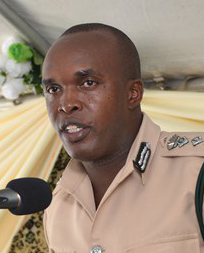The Guyana Prison Service (GPS) recently held a week-long celebration in observation of its 36th Anniversary with great emphasis being placed on the rehabilitation of the 1917 prisoners now in the system.
This year’s activity was held under the theme “Changing Lives: One Inmate at a time” which seeks to highlight efforts to change existing behaviour, provide job training and provide a support mechanism to increase the chances of success for rehabilitation.
Director of Prisons (ag) Gladwin Samuels during his address at an anniversary service which was held to commence the week’s celebration said that over the past years, the prison administration has embarked on “aggressive” programmes that seek to bridge the gaps between crime, punishment and rehabilitation.
“Crime, punishment and rehabilitation, unfortunately are basic ingredients found in every society from the moment man endeavoured to organize and live communally. That recipe has bedeviled social scientists, psychiatrists and counselors for centuries,” Samuels said.
He noted that it is the view of the GPS that efforts at punishment without rehabilitation condemn an individual to an existence without hope. “An existence without hope will invariably lead to recidivism and a life of crime that will further jeopardize our individual and collective security,” Samuels added.
Several criminology studies, according to Samuels have shown that harsher sentences do not necessarily act as deterrents, and may even slightly increase the likelihood of repeat offending.
In fact, he stated that those studies have shown that social intervention and support, combined with punishment and encouragement are much more effective in preventing crimes.
“In other words, if an inmate is not exposed to opportunities that contribute to positive changes, leaving prison and returning to a life of crime would likely be their first option,” Samuels said.
He explained that while the revised laws for the GPS to move formally to a fully correctional institution have not yet been passed, the existing ones provides sufficient guidelines for the allowance of rehabilitation as a critical part of the mandate.
This process, Samuels said is an ongoing one.
He explained that with the support of the Ex-Prison officers association and several other bodies, the administration of the GPS has embarked on a number of programmes in an effort to rehabilitate and re-integrate “law breakers”.
The prisons population is currently at 1917. “Of that amount 371 (19%) are persons between the ages of 18 to 30. 354 males and 17 females. 62 (17%) of these are imprisoned for drug-related cases. Rehabilitate them all we must,” Samuels related.
Of the total population, he said 1074 inmates have been exposed to various training such as academic training in the CXC Mathematics and Literacy and Numeracy, skills training in the areas of agriculture, barbering, electrical installation, tailoring and wielding and psycho social training continues in anger management, domestic violence, and drama.
The degree of success of these programmes, Samuels noted has been mixed.
“While most of the inmates seem to be doing their part, the incontrovertible truth is that, whatever form any initiative takes, it requires the total commitment of all stakeholders for the exercise to be successful,” Samuels added.
The Acting Prisons Director further stated that inmates will receive behavioural counseling and job training in the various disciplines so that after their release they can support themselves and even their families.
“Civil society can ease their re-entry by not stigmatizing them, and providing opportunities for optimum employment wherever possible. Families will have to provide the necessary support systems so they are not pressured to return to a life of crime,” Samuels noted.
He said any programme that seeks to invest in the inmate’s future relieves the pressure of crime countrywide and enhances security.
This year, according to Samuels has seen a decrease in the number of prison staff, some of whom were dismissed due to breaches of prison rules.
Last year, he said there were 501 staff members in comparison to 495 presently.
“We have since recruited 37, have seen the retirement of 12, resignation of 7 and 24 would have been dismissed for several breaches of prison rules. Today, we have 495 staff members”, Samuels said.
Despite the challenges, he noted ranks continue to receive both local and overseas training with the hope of capacity building.
On the other hand, he further related that improvement of working conditions is a work in progress and much more is required.
“Over the past three years we have seen 90% increase in our budgetary allocations for the year 2017, (when compared with 2016), 4.5 % in 2018 (as compared to 2017) and 10.93 % in 2019 (as compared to 2018). Comparable increases in our take-home pay would be highly appreciated,” Samuels said.
“…..With fewer people in prison, correctional facilities need less money to operate, thus requiring less money from taxpayers. Since educational, vocational, and drug rehabilitation programmes decrease the likelihood that inmates will re-offend, they also allow ex-convicts to contribute to society, boosting the economy,” he added.



